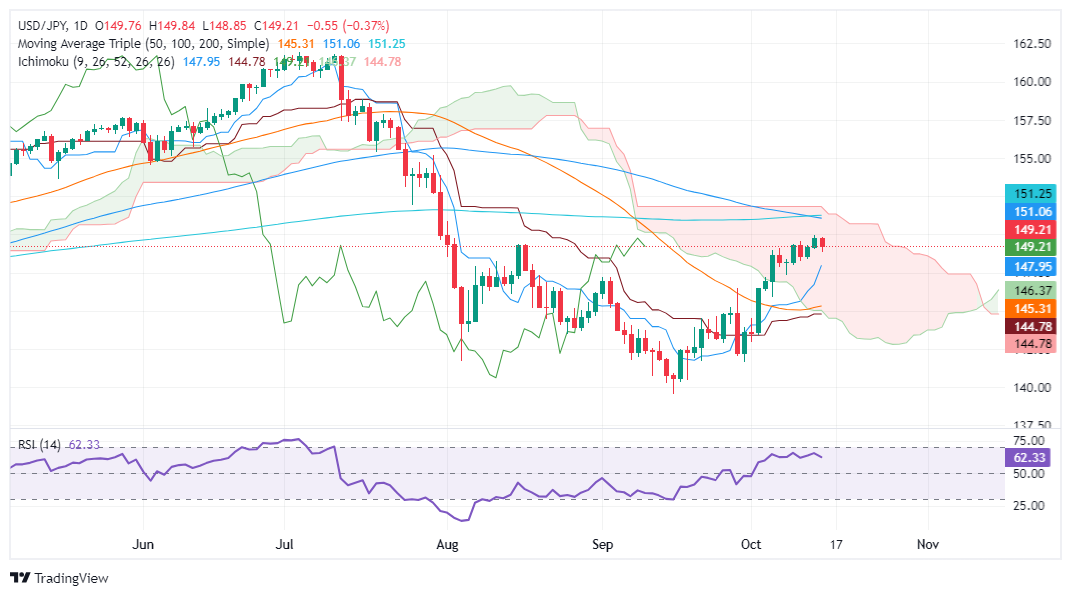- Analytics
- News and Tools
- Market News
- USD/JPY Price Forecast: Dips towards 149.00 on falling US yields
USD/JPY Price Forecast: Dips towards 149.00 on falling US yields
- USD/JPY slips to 149.21 as US 10-year Treasury yield drops over eight basis points.
- Despite recent dip, the pair remains in a neutral to bullish stance, hovering inside the Ichimoku Cloud.
- Key support at 149.00; a break below could trigger further declines towards 147.95 and beyond.
The USD/JPY slipped over 0.30% on Tuesday due to risk aversion and falling US Treasury bond yields. The US 10-year benchmark note rate plummeted over eight basis points (bps) and pushed the exchange rate lower due to its positive correlation with the pair. At the time of writing, the major trades at 149.21, flat as Wednesday’s Asian session begins.
USD/JPY Price Forecast: Technical outlook
The daily chart suggests the USD/JPY is aimed steadily higher, though it is neutral to upward biased.
Although technical signals suggest buyers are in charge, the USD/JPY remains inside the Ichimoku Cloud (Kumo) and caps its advance. Also, despite being bullish, the Relative Strength Index (RSI) has failed to clear the latest three peaks, showing the uptrend could be overextended.
With USD/JPY climbing above 150.00, this clears the path for a move upwards to the 100-day moving average (DMA) at 150.98, ahead of the 200-DMA at 151.27.
If USD/JPY falls below 149.00, the Tenkan-Sen at 147.95 emerges as the first line of defense for bulls. Once surpassed, the Senkou Span A at 146.48, followed by the 50-DMA at 145.36, would be the next key support levels.
USD/JPY Price Action – Daily Chart
Japanese Yen FAQs
The Japanese Yen (JPY) is one of the world’s most traded currencies. Its value is broadly determined by the performance of the Japanese economy, but more specifically by the Bank of Japan’s policy, the differential between Japanese and US bond yields, or risk sentiment among traders, among other factors.
One of the Bank of Japan’s mandates is currency control, so its moves are key for the Yen. The BoJ has directly intervened in currency markets sometimes, generally to lower the value of the Yen, although it refrains from doing it often due to political concerns of its main trading partners. The BoJ ultra-loose monetary policy between 2013 and 2024 caused the Yen to depreciate against its main currency peers due to an increasing policy divergence between the Bank of Japan and other main central banks. More recently, the gradually unwinding of this ultra-loose policy has given some support to the Yen.
Over the last decade, the BoJ’s stance of sticking to ultra-loose monetary policy has led to a widening policy divergence with other central banks, particularly with the US Federal Reserve. This supported a widening of the differential between the 10-year US and Japanese bonds, which favored the US Dollar against the Japanese Yen. The BoJ decision in 2024 to gradually abandon the ultra-loose policy, coupled with interest-rate cuts in other major central banks, is narrowing this differential.
The Japanese Yen is often seen as a safe-haven investment. This means that in times of market stress, investors are more likely to put their money in the Japanese currency due to its supposed reliability and stability. Turbulent times are likely to strengthen the Yen’s value against other currencies seen as more risky to invest in.
© 2000-2026. All rights reserved.
This site is managed by Teletrade D.J. LLC 2351 LLC 2022 (Euro House, Richmond Hill Road, Kingstown, VC0100, St. Vincent and the Grenadines).
The information on this website is for informational purposes only and does not constitute any investment advice.
The company does not serve or provide services to customers who are residents of the US, Canada, Iran, The Democratic People's Republic of Korea, Yemen and FATF blacklisted countries.
Making transactions on financial markets with marginal financial instruments opens up wide possibilities and allows investors who are willing to take risks to earn high profits, carrying a potentially high risk of losses at the same time. Therefore you should responsibly approach the issue of choosing the appropriate investment strategy, taking the available resources into account, before starting trading.
Use of the information: full or partial use of materials from this website must always be referenced to TeleTrade as the source of information. Use of the materials on the Internet must be accompanied by a hyperlink to teletrade.org. Automatic import of materials and information from this website is prohibited.
Please contact our PR department if you have any questions or need assistance at pr@teletrade.global.
















